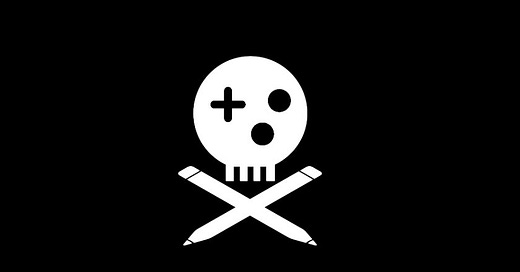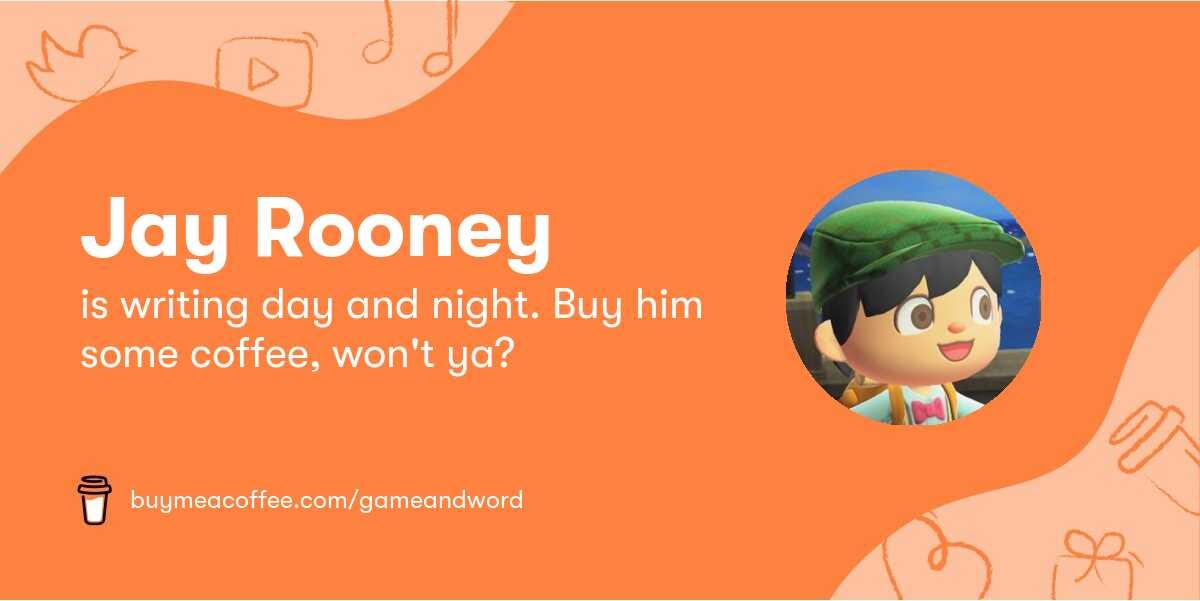NOTE: Gmail users, you might see a truncated version of this message. If this happens to you, just click the “View entire message” link next to where it says “[Message clipped]” to read the rest.
Table of Contents
Introduction
Newsletter Updates
Podcast References
Transcript
Footnotes
Introduction
Ahoy, me hearties!
Wow, guess that’s the last time I’ll open with that in a while :-(
Alas, all good things must eventually come to an end, including this series. This bonus podcast will be Volume 2’s last issue, which means our exploration of pirates and video games ends here. For the time being, at least.
And while I’m excited for Volume 3, I can’t help but feel a little melancholic while wrapping up this topic. Fortunately, we’ve got a great guest and an awesome conversation for you this week. So, let’s end our pirating expedition with a BANG! from the cannons and another tankard of grog. YARRRRR!!!
Also, if you want a refresher on the entirety of Game & Word: Volume 2 before you listen, here’s the complete series:
Issue 1 ● Issue 2 ● Issue 3 ● Bonus 1 ● Issue 4 ● Issue 5 ● Issue 6 ● Issue 7 ● Issue 8
You can find this week’s podcast references, footnotes, full transcript, and a couple of big updates after the updates section. See you next week!
~Jay
PS—If you really enjoy this newsletter, but aren’t ready to commit to a paid subscription, consider buying me a cup of coffee. Just $5 will fuel one full night of writing. Just click the image below ☕️:
Newsletter Updates
Our guest this week, Dr. Anthony Bean, has set aside two signed copies of his books (listed below), which Game & Word will give away to two lucky subscribers! For more details, be sure to read next week’s newsletter, when the giveaway officially launches.
Podcast References
Books
REMEMBER: Game & Word will be giving away one signed copy each of The Psychology of Zelda and The Psychology of Final Fantasy. More details next week! If you’re the impatient type, you can purchase the book
The Psychology of Zelda, edited by Anthony M. Bean, Ph.D.
The Psychology of Final Fantasy, edited by Anthony M. Bean, Ph.D.
The Psychology of Pokémon, edited by Anthony M. Bean, Ph.D. [PRE-ORDER]
Games
Extras
Transcript
NOTE: This transcript has been lightly edited for clarity.
Game & Word: Hi everyone, Jay here. Just wanted to let you know that at one point during the interview, we talk about the IGD-9 form; its correct name is the IGDSF-10. Just FYI.
[BLEEP]
Game & Word: Hello everyone. And welcome to another bonus edition of Game & Word. I have with me right now, Dr. Anthony Bean: the gamer psychologist, in a nutshell.
Anthony Bean: Anybody—like a gamer, geek, everything. Certified Geek Therapist. We run Geek Therapeutics, where we train people on how to work with video games. We actually have a really cool, “Problematic Gaming” course coming out. It's probably gonna be 12 to 15 CEs [Continuing Education Credits], that is gonna really hit it more from the idea of “gaming is a healthy mechanism, but we just need to work on the mental health symptoms.”
Game & Word: So when you say “problematic,” do you mean problems that are external to gaming, or that involve the act of gaming itself? Or is [gaming] therapeutic?
Anthony Bean: It's kinda all of it. So, what we know basically about the World Health Organization's coming out with their “gaming disorder” [classification], I would say a good 70-80% of therapists are out there being like, “Yeah, we see this as a problem, but we don't see it as the same problem as what the World Health Organization’s doing."
The other 20% are... not great clinicians, is what I would say. Just because it's based in not a great narrative and really faulty research. But what we're doing, is we're taking what is the good research—things that have double-blind studies, things that are verified with good actual psychometrics, not this thing that's "I gave them the IGD-9 short form1 [IGDSF-10] and, look at this, they have all of these symptoms!" And it's "yeah, but the IGD-9 or Short Form SF [IGDSF-10] has been disproven multiple times." Wo we basically take all the good research, we teach people about everything from neurotransmitters to beginning behaviors, to a whole bunch of other stuff.
So, one of the big things that always comes into play is, “Well, games are just releasing all this dopamine" type stuff. Yes, games release 170% more dopamine than other stuff in life. But guess what? Cocaine's 10,000%. Cheese is 300[%]. Some foods are higher than that, too. If you're going to be taking that little small statistic, let's give it some breathing room and let's show what other types of dopamine receptors come in. When you go and eat a piece of pizza, and you've higher dopamine dopaminergic information happening in your brain, and you're like "gaming's the problem,” you're a little wrong.
So, that's what the whole thing is. We're taking it, and then we're gonna hit it from five different viewpoints of “how do we treat problematic gaming?” Cause we don't treat it as gaming addiction. We treat it as a union approach, as a social construct, family approach, behavioral for ones that get really difficult, a mindfulness one, and then also a one based on trauma, because we've all experienced some trauma and we've seen a lot of things happen that way.
Game & Word: Wow. That’s…
Anthony Bean: It's a lot!
Game & Word: No, it's good! It's good work. It's important work. Certainly, I as a gamer, I'm glad that you're out there basically advocating for us within the mental health community. That's very important work. So thank you for doing it.
Anthony Bean: Absolutely. We like what we're doing, and we like to making sure that we spend the correct amount of time going on with it.
Game & Word: And speaking of time going on with games… this interview is part of a series that I'm doing on pirates, and specifically video games about pirates. And the one that I want to connect this particular interview to is Sea of Thieves. Have you ever played Sea of Thieves?
Anthony Bean: I have a little bit, more of my clients have. And they talk about how they just actually act like pirates and wait behind rocks until someone comes by with the quest’s mega treasure and steal it.
And they're like, we really feel like, we're being a-holes and I was like, “You're playing the game the way it was meant to be played!" If someone is a pirate, but they're finishing a quest, it's your duty to go and take it, take that back from them.
Game & Word: Absolutely, like I was playing and I was matched up with some random dude.
I could tell just by his title and everything, he out leveled me by at least a factor of 10. But whatever, we outfit the ship, we get our provisions, just whatever, we set sail, we chart a course. Just to kill some time, I take out my Hurdy-Gurdy and start playing a shanty, and this dude just throws a blunderbomb and he knocks me overboard!
Anthony Bean: And you’re like, “Oh, man!”
Game & Word: But at the same time, I was like, “That's funny, in a sitcommy way.” Like imagining a pirate getting thrown overboard, just for being a terrible musician.
But that brings me to what I wanted to talk about: inhabiting this archetype of the pirate. Why is it so enduring and so appealing?
Anthony Bean: It really is because we don't have a chance to actually act like that anymore.
Obviously, we have Somali pirates and things like that. But there are quite a few instances [in games] where we get a chance to live and do something that we don't, that doesn't exist in this world anymore. So like these types of swashbuckling pirates—you could take this video game, you can take World of Warcraft, even. Do you know how many people spent hours upon hours of hardcore grinding for the pirates down in Southshore Bay?
There are lots of people that were able to do that. And they did it so they could dress like a pirate, and because they don't exist. And honestly, they're fun, to do that. There's always a big thing of what is a pirate versus a ninja. I personally fall more into the ninja side, but pirates still are really fun.
And if you get to be a pirate, you follow the Code. And the Code is whatever's best for you.
Game & Word: Pretty much. It's called "Sea of Thieves."
Anthony Bean: Not "Sea of Friends"!
Game & Word: Yeah! It's it's funny because, what I think is cool about Sea of Thieves particularly compared to, say, Assassin's Creed: Black Flag—which is perhaps more realistic in its portrayal of pirates—is that I feel like it just lights up a part of my brain that satisfies that need better, even though it makes no claims of actually being accurate.
Anthony Bean: And it doesn't have to be accurate. But I think that's honestly one of the best things that Ubisoft did with that one, is that they went back and they looked at some historical [facts] and they broadened it. That's one of the big things that comes into play, is ,”Can you bring it in, and can it be done in a way that's realistic?" And they do a pretty good job with it.
Game & Word: Oh, a very good job, actually. Which is rare, not just for video games, but just media in general. But then also, whereas, say a game like Sea of Thieves, which makes no claims to be accurate, it's very much like all tropes. How does that fit in and the whole kind of schema of wanting to act like a pirate?
Anthony Bean: There's a lot of cool things that you get to really develop when you're pretending to be a pirate. That's something that I think is true to any avatar that we go and play with online.
And that avatar means something to us. Like, sometimes I want to be a space pirate. I will go and destroy someone's ship, just cause I'm like, “You're just close to me.” That's how it goes.
Game & Word: And what does it say about us just as people, that we have this urge to basically be a**holes? That we need that outlet?
Anthony Bean: The idea is that we get to rinse and repeat. We don't have any real consequences in the game. Just cause we play as some sort of trope inside the game, it doesn't mean that's how like we are in real life. And I think that's the difference between what we see with people, and what we can see moving ourselves forward in a different way, as playing these different characters or being able to engage them. And it works in all video games.
Pirates are just one of those heavily cultured ideas that are very well versed in the world, where you can read about pirates. They really existed. And I think that there's a little bit of a different motive for us to play that, because we're like, “These people lived this way, and we're going to try to live that way too," versus someone who has magical powers and things like that. Because, you know, unfortunately we got the wrong end of the stream on that one, in my opinion. I would like to have magical powers!
Game & Word: How does it differ? How does it fulfill different needs, when we play something that's more real versus one that's purely fantastical? Or is there a distinction at all?
Anthony Bean: It fulfills something for us on the inside. I'll give an example: when I'm in a very creative mood, I play very specific games because it helps to flesh those things out, and in different ways. It's not something that is just a one-and-done type thing. It's if I'm creative and I'm looking for some inspiration, I'm playing a spacefaring game. I need the expanse. I need to be able to take over the world. I need to be able to do a lot of stuff.
If I am just looking to kill some time, that's probably an MMO. It just goes into one of those things are pretty simpler. But it falls into those types of ideas a little bit more.
Game & Word: And in video games, the secret weapon, is of course the interactivity. The fact that you're taking an active role in the story. So how does that impact the effect, or the needs, that playing a different role fulfills for us? Versus, say, watching a movie or something.
Anthony Bean: We get to actually have the interaction with it. Versus us just watching [a movie], immersed within it, but not interacting with it. And I think that's what the controller—that's what video games really bring into and delight for us. It brings us farther than a movie because we actually get to interact with the world around [us].
Game & Word: And with VR…
Anthony Bean: it's coming, man! There's people like, “I don't know when this is going to happen.” And you're like, “Oh, it's around the corner!” Because we're starting to get some therapeutic-type stuff that we can start working with.
Game & Word: And it's awesome! But yeah, going back to pirates—I've mentioned archetypes of pirates. So for our listeners who may not be as familiar with the concept, could you tell us what is an archetype?
Anthony Bean: So, an archetype is like a sense of energies. Think of it as like a constellation of characteristics that all come together.
And when you fit them into these types of pieces together, like a pirate puzzle, then they form a bigger picture. And if you take some of those out and put them into another puzzle and put that together in that form—something else—that's a different archetype.
So things like the idea of the God of Mischief, Loki. He is an archetype that we work with of a Trickster—[that] would be the higher order one. And then he's embodied by Loki, so that would be a lower form, is what we would call him.
Because the higher [the] form that you go, the more metaphorical it becomes, and more all encompassing. A good way of looking at it is a kind of like a house of cards where the top card is like the top of the archetype. And as you come down, it gets more and more nuanced and it loses a lot of what the essence of the original archetype was.
Game & Word: So what makes certain archetypes more enduring or appealing to people?
Anthony Bean: It's really the things that we call video game tropes. If we look at video games in themselves—anime goes the same way, [so does] a whole bunch of geekdom—we could start seeing these very same tropes come across [repeatedly].
And those tropes are archetypes in a sense. And so, as we get to play as a trope—AKA, let's go rogue, paladin, wizard, magic caster, magic user—those are video game tropes, and those are also archetypal essences. If you tell someone like, “Oh, I play a warlock,” they're like, “Oh, you're a magic user, and you probably do things along these specific lines." And, I would say 99% of the time they're going to be right, because that's what the idea of an archetype is for them.
Now, what makes them so wonderful to be playable is because us as video game players, we want to experience these different things. Now, I wouldn't be surprised if, let's say, we’d reverse our worlds and we actually had magical powers and stuff like that, we wouldn't be playing games about magic! We would be playing games about something else, maybe not having magic, and how do we have to problem solve our way through without using magic?
Because if you know all the anime, all the games and everything, if you rely too heavily on magic, you lose your ability to figure out how to solve everyday problems. In other ways, it's the same idea with technology today in our world. So if you were living in a magic world, you'd be playing [in] a scientific world with technology, and that's like the inverse.
That's the fear with technology, that we're becoming so reliant on it that if we'd lost it, the world would cease to function. That's the same idea of the magic world. If you become too reliant on that, then it becomes a different sense of who we are, if that makes sense. We can't hold onto what used to be, and once we lose it, we don't know how to function any longer. I do enjoy the animes that do that and pull that type of plot and be like, “Oh, you're too reliant on magic, and now this thing's gone."
And [all] those types of things that function a little bit differently for us, because it's really important for us to know the difference between them all.
Game & Word: And why do we come up with archetypes or identify archetypes to begin with? Like, [did they make] us into who we are? Or, was there a certain benefit, maybe it helped our ancestors survive or whatnot? How is it that they exist?
Anthony Bean: It's a harder question, and much longer than what we have, because it goes all the way back to early shamanism. So, in early cultures there's the idea of healing and religion and everything comes out of philosophy.
And before philosophy there was shamanism, and the concept of that was, “I can function in these different ways if I believe I am being held captive by this different type of god or these other things,” like before they [were] considered gods. Now, the gods are in our world.
Does that make sense?
Game & Word: It does. Could you provide an example?
Anthony Bean: Sure. Let's use Greek gods because everyone knows them. It's a lot easier than using Norse gods or other stuff. If we were to be aggressive or something like that, we would be held in captive archetypally by Ares. If we were to think through our problems, it would be Athena. If we were to be the ruler, it'd be Zeus. Those are types of ideas; people would see these [figures] and not necessarily worship them as deities, but more along the lines that they are blessed with the powers of the gods on some level.
Game & Word: Got it. And what are the therapeutic applications?
Anthony Bean: When we know what archetype we are being held captivated by, as a plus and a negative side, we can then be like, “All right, what is it trying to teach me, in a sense? What does it mean?” Obviously I'm not being held in god's arms or anything like that, and they're not siphoning something towards me.
But it's something along the lines of, “What is the message that's trying to come out of life here?" We then say, “If Zeus is trying to teach me to be a better leader, how do I incorporate that into my area here? If I'm being idolized, do I really want to be idolized, or do I want to be a good boss?”
That's the type of thing that we tend to go for.
Game & Word: And regarding pirates specifically, what do you think their domain is, in contrast to, let's say, other types of outlaws like cowboys or bandits?
Anthony Bean: Yeah. They're ruthless, they are chaotic, and you don't really know which way they're going to go.
And they are sometimes entertaining. But they are not someone that you really want to cross very easily. That's the idea. So you're your presence is emboldened within them.
Game & Word: Hence, why if you're being an a**hole, you're playing Sea of Thieves correctly.
Anthony Bean: And so that's the thing. Think about it like Johnny Depp's Pirates of the Caribbean. If you're going on quests and you're bringing something back, you're literally the commandant. That's your role. You're like, “No, I'm playing this game!” No, you're really the commandant. The people who are playing the game correctly are the ones hiding behind those rocks over there, that are going to come and destroy you, take your thing, and then run away.
Game & Word: And what are some good resources that you would recommend for people who might want to learn more about archetypes?
Anthony Bean: There are a wonderful amount of reading opportunities. Go on Amazon to look, and get the Kindle versions if you'd like, but you can just type in “archetypes” and you will literally be endowed with them in lots of different forms.
And there's tons and tons of wonderful writers. And there's a whole bunch of different types of ideas that come out, and that's honestly the easiest place to get it. You can get my book, but mine's on video gamers and stuff like that. And the archetypes have expanded past what's in there right now, too.
Game & Word: Great. And I know you've touched on this earlier, but let's dive into it: so, pirates vs. ninjas?
Anthony Bean: (Laughs) This is always the college thing. My wife and I were just talking about this tonight. We went to colleges on opposite ends of the country. And she asked me tonight, out of the blue—we call this a “synchronistic moment,” because she didn't know I was doing this tonight, specifically on pirates.
And so she’s, “At your college, did you ever have a thing called ninjas versus pirates?" And I was like, “Yep, I was one of the big founding ones for my college.” She goes, “Yeah, I'm a pirate." I said, "I'm a ninja."
So that's one of the things, that she didn't even know this was happening. And I told her, then she goes, “Man, we were definitely in the right head space."
Game & Word: That is an awesome story. Watch out though, sleep with one eye open!
Anthony Bean: Absolutely. We, we definitely try to, in some ways, especially since our kids are the ones that get up, they are like little ninjas and then turn into pirates, [throw] tantrums, then they're downstairs. So they're like good mix of us right now.
Game & Word: And then as far as games besides Sea of Thieves, if you feel like getting your pirate on, are there any that you gravitate to particularly? Or even just to your get your rogue on, or whatever.
Anthony Bean: it's a really hard one, because I haven't really had as much time as I'd like to be playing lately.
But the game I'm actually playing is Pokémon and I am being a ninja in it. And if anyone's playing the new Pokémon Arceus—or "ar-SEE-us" is what I'm starting to hear. And I was like, “I don't know. I'm just going to call it ‘ar-KEY-us’ cause that's how it's phonetically looks to me, guys.”
Anyways, now it's my turn to jump on the Pokémon from the grass. It's my turn to throw something at them. And from the grass! It's not theirs. It's mine. Which I'm like, “This is happening!” Yeah, so I would say I'm being like a little bit of a rogue, and I'll just wait for a whole bunch of Pokémon to come on through, and then I'll just target and go “boom,” and catch all three of them at once. At which point, I can run away. It's really fun.
Game & Word: Before we sign off, do you want to plug some pluggables?
Anthony Bean: Yeah. Anyone that really wants to know what we're doing, go and find us on any social media, @GeekTherapeutics. That is really the big thing of what we do. We have tons of merchandise. We do tons of trainings. We're at conventions. We're going to be at at least six this year.
And it is a wonderful thing to be able to transform this knowledge into a viable space, and to see so many people benefit from it. That's the big thing you can find in all of our books: [Psychology] of Zelda, [Psychology] of Final Fantasy, and soon to have our Kickstarter put back up again, because we made our deal with Nintendo for [Psych] of Pokémon.
Game & Word: Wow, they let you do it?
Anthony Bean: They let us do it. They acknowledged that our book falls under free speech. But they don't let us do the artwork, unfortunately.
Game & Word: Hey, with Nintendo…
Anthony Bean: I take it as a blessing! So that's fine, I changed around the cover. It's not a big deal.
Game & Word: Cool, and if people want to get in touch with you, follow you on the socials, yada yada, what's the best way for people to reach you?
Anthony Bean: That would probably be messaging us through Geek Therapeutics on our Facebook chat. Cause I'm usually on that, or send me an email at anthonymbeanphd@gmail.com or anthony@geektherapeutics.com.
Game & Word: All right. There you go. Ladies, gentlemen, and non binary folks, everyone: Dr. Anthony Bean. Thank you very much for talking to me tonight.
Anthony Bean: You are more than welcome!
Footnotes
The correct name for this form is IGSF-10















Share this post